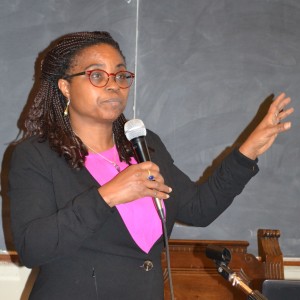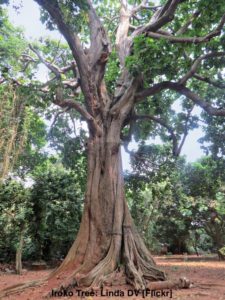The Beginning of Iroko
Associazione Iroko Onlus was set up by founder Esohe Aghatise in 1998 for three main reasons:
- the need to address the difficulties of finding jobs for women which allow them to exit prostitution and integrate into society
- a need for a safe place where people could come and speak to people like themselves and have things explained to them in their own language
- the need for a space where migrant women’s cultural differences were valued and allowed to be used to provide support and solutions to their problems.
The Early Days
Iroko started by offering direct support to people in need in terms of help finding jobs and places to live, as well as negotiating their way through the health services. Later we also got involved in work against trafficking and sexual exploitation at an international level, which is where we first came into contact with the idea and the movement around abolitionism, which we then brought back to Italy to begin the local network.
 Founder’s Story
Founder’s Story
From International Economic and Trade Law to Human Rights
Esohe was always a passionate advocate for women and children, but not specifically for victims of trafficking and sexual exploitation. She started her career in Law, studying, working and teaching in the field in Nigeria for several years. Following a Masters degree in International Economic and Trade Law, she first came to Turin, Italy, in 1992 to take up a place on a postgraduate Trade Law Course run by the Turin Institute for European Studies at the ILO Centre. She subsequently stayed in Italy to study for her PhD and ultimately set up a home here. During her first years here, she was approached to work as a kind of informal translator/mediator for the police who were investigating the relatively new phenomenon of women being trafficked from Edo State for the purpose of sexual exploitation.
It was through this work that she came into contact with some of the women who had been trafficked from Nigeria and were being exploited in the Italian sex trade, and she came face-to-face with a reality that she couldn’t ignore. From this her passion for humans rights, and especially women’s right to live a life free from harm and violence, grew and eventually led her to set up her own organisation.
Exploring her ideas around Prostitution as Work
Through her translation and mediation work in the early days, she came into contact with other organisations in Turin that existed to offer support to women who were victims of trafficking, but she found herself increasingly uncomfortable with the common attitude towards prostitution as a valid work option. Women who found it difficult to find a job were often encouraged to remain in prostitution, but keeping their earnings for themselves rather than their exploiters. Although Esohe was very open about women’s rights to choose their own destiny and did not make any moral judgements about prostitution as an activity, she felt instinctively uncomfortable with encouraging women to stay in prostitution because of the patriarchy underlying it, and the obvious violence and trauma that these women were subject to regardless.
Why the name Iroko?
 When considering names for the association, the focus was on choosing something with a clear connection to the cultural origins of the women Iroko worked with, who were predominantly Nigerian from Edo State. Iroko is a huge tree that is a symbol of strength in Benin Culture. When a new Oba (king) is crowned, a portion of the ceremony is carried out at the Iroko tree, which serves as a standing representation of his strength as a king. There is another association locally with witches and wizards, that is often interpreted in a negative way, but Esohe says, “in anything negative there is also a positive aspect,” and she also thought about the fact that strong women in history were branded as witches, often just for expressing themselves and their identity. For her, the name represents a “capacity to deal with and overcome conditions of difficulty, challenges, being able to fight back: strength.”
When considering names for the association, the focus was on choosing something with a clear connection to the cultural origins of the women Iroko worked with, who were predominantly Nigerian from Edo State. Iroko is a huge tree that is a symbol of strength in Benin Culture. When a new Oba (king) is crowned, a portion of the ceremony is carried out at the Iroko tree, which serves as a standing representation of his strength as a king. There is another association locally with witches and wizards, that is often interpreted in a negative way, but Esohe says, “in anything negative there is also a positive aspect,” and she also thought about the fact that strong women in history were branded as witches, often just for expressing themselves and their identity. For her, the name represents a “capacity to deal with and overcome conditions of difficulty, challenges, being able to fight back: strength.”
‘Discovering’ Abolitionism
Meeting other people, through the UN Working Group for Contemporary Forms of Slavery, who were already active in the field on the international stage, became a key turning point for Esohe and the association. Activists Janice Raymond, Dorchen Leidholdt, Malka Marcovich, Agnete Strom, and Julie Bindel first discussed the ideology and terminology around abolitionism with Esohe and she immediately felt that their position rang true with her own experiences in Italy. This also opened up opportunities internationally to receive funding and participate in the development of laws and policies around women’s rights.
During the same period when she was working as a mediator and translator in Turin and thinking about setting up her own organisation, Esohe was instrumental in the establishment of the Frantz Fanon Centre in Turin in 1997, which works in the field of mental health for migrants.
For more information about Esohe’s story and her international role in the abolitionist movement, you can read this profile written by Janice Raymond, an American author, activist and key figure in the movement.
